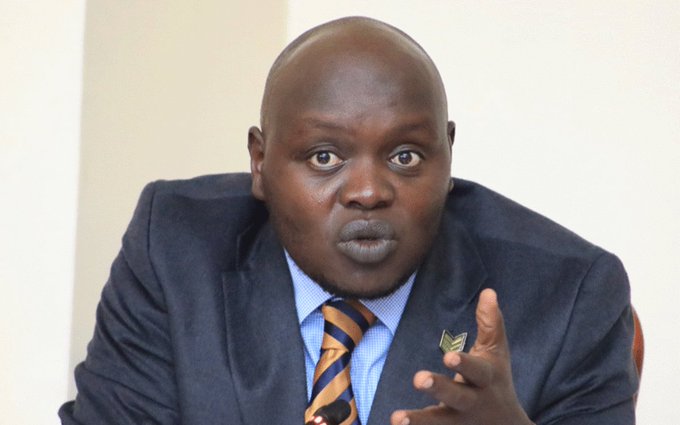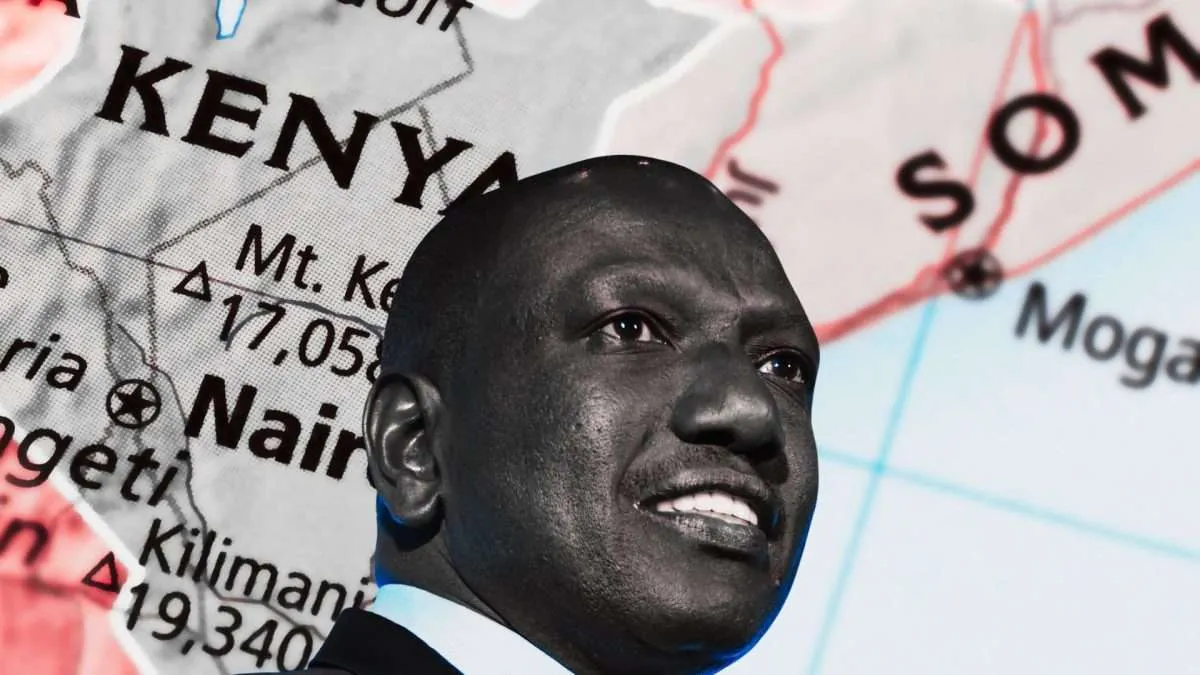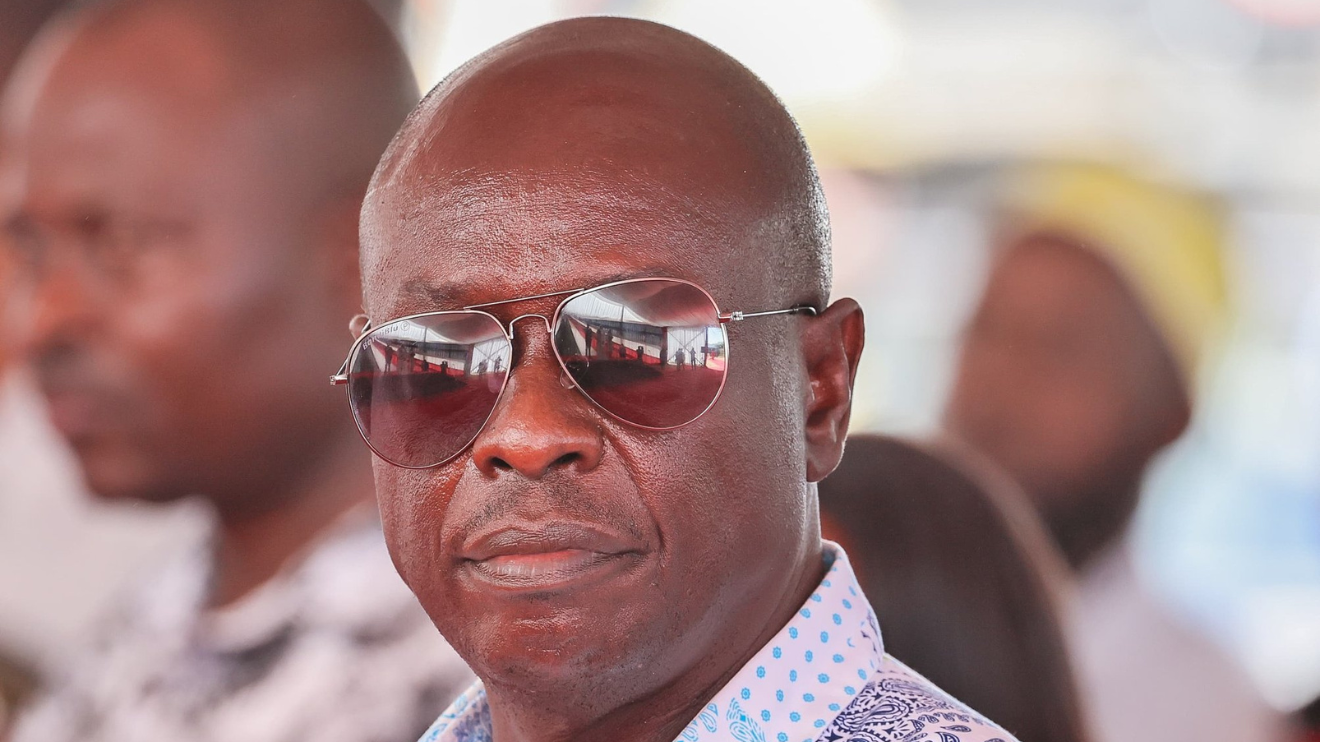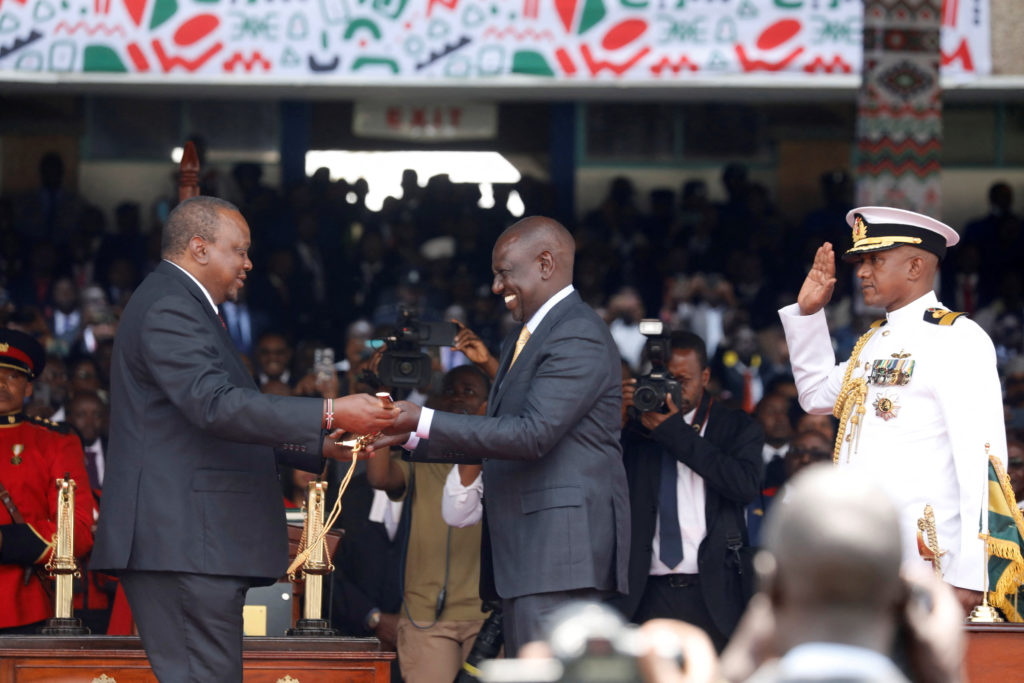Politics
Cherargei’s Bill for Kenya Presidential Term Extension Faces UDA Backlash
Many Kenyans have expressed strong opposition to the bill, fearing it could undermine the country’s democratic principles.

:Senator Samson Cherargei, a key figure in the United Democratic Alliance (UDA) and a close ally of President Ruto, contends that the current five-year presidential term is inadequate for fully implementing a leader’s agenda, particularly given the electoral disputes that frequently disrupt governance stability.
By Charles Wachira
Senator Samson Cherargei of Kenya is proposing a bill, aimed at extending the presidential term from five to seven years and the idea has ignited controversy, with critics alleging it’s a ploy to prolong President William Ruto’s rule.
Cherargei, a member of the United Democratic Alliance (UDA) closely aligned with Ruto, argues that the current five-year term isn’t sufficient for presidents to effectively implement their agendas, especially considering electoral disputes that often delay governance stability.
“Seven years will provide ample time for a president to deliver on their manifesto,” Cherargei defended during the bill’s Senate reading. He emphasized that frequent elections disrupt long-term development projects crucial for national growth.
This isn’t Cherargei’s first attempt at such reforms.
Similar proposals were previously rejected by the public through the National Dialogue Committee co-led by Ruto and opposition leader Raila Odinga in 2023. Now reintroduced, the bill also seeks to extend terms for MPs and governors to seven years and introduces the role of a prime minister appointed by the president.
Francis Chege from the former ruling Jubilee Party views the bill as a maneuver to benefit the political elite rather than the public interest.
“These proposals favour the political class and not the people,” Chege criticized.Adding that the move is “a plot to extend Ruto’s rule,” saying that the government may be “testing the waters” through such proposals to gauge public reaction. “This is about power consolidation, not the people,” Chege added, echoing the views of many who see the proposal as a threat to democratic accountability.
In contrast, Eugene Otieno, a history teacher, supports the concept but advocates for a single seven-year term to reduce political motivations.
“A single term would make the presidency less about re-election and more about governance,” Otieno suggested, stressing the need for extensive public consultation on such constitutional changes.
. “A single term will make the presidency less attractive for those looking to stay in power for personal gain,” Otieno said. He believes that a one-term presidency could allow a leader to focus on governance without being distracted by re-election campaigns, but insists on thorough public consultations before any changes are made.
Many Kenyans have expressed strong opposition to the bill, fearing it could undermine the country’s democratic principles.
Social media platforms and local talk shows have seen an outpouring of criticism, with citizens arguing that extending terms would likely lead to complacency, weakened checks on government performance, and potentially a rollback of democratic gains achieved over the past two decades.
A common refrain among opponents is that Kenyan politicians are trying to “change the rules of the game” to suit their own interests once in power.
At the grassroots level, many Kenyans are also frustrated with the slow pace of governance, which they attribute more to political inefficiency and corruption than the length of the president’s term.
Extending the term to seven years is seen by some as a distraction from addressing pressing issues such as unemployment, inflation, and the high cost of living.
Political analysts like Carol Situma argue that the timing of the proposal is highly suspect, especially given the economic challenges Kenya is facing.
Situma calls it “a diversionary tactic” designed to shift public attention away from more pressing issues, such as rising public debt, ongoing disputes over privatization deals, and unfulfilled promises by the Ruto administration.
Overall, public sentiment reflects a deep skepticism of the bill. Many citizens view it as an unpopular attempt to manipulate the constitution for political gain, and the likelihood of widespread public protests or backlash is high if the proposal gains traction in Parliament. Moreover, the memory of Kenya’s long struggle for constitutional reform and democracy makes many wary of an
The timing and intent behind Cherargei’s bill have sparked skepticism among analysts.
When reached for comment, UDA officials remained inaccessible. However, in previous statements, the party has distanced itself from Cherargei’s proposals, asserting their commitment to the existing constitutional framework.
“The UDA respects differing opinions, but these views do not reflect our party’s stance or that of our leader, President William Ruto,” a UDA spokesperson clarified in response to earlier similar attempts by Cherargei.
As the bill undergoes committee scrutiny in the Senate, its fate hinges on public feedback and legislative debate, with significant implications for Kenya’s political landscape if passed.
What’s Ruto’s position?
President Ruto has so far remained officially non-committal on the bill However, through his party, the United Democratic Alliance (UDA), Ruto has distanced himself from previous attempts by Cherargei to amend the constitution for similar reasons.
In 2023, Cleophas Malala, then Secretary General of UDA, made it clear that the party did not endorse such proposals. Malala emphasized that any changes to the presidential term would require a referendum, adding that President Ruto was committed to upholding the current five-year term limit as enshrined in the constitution.
“The president remains focused on delivering his development agenda within the mandate given by the people of Kenya, and he has no intention of pushing for constitutional amendments to extend his term,” Malala said at the time, addressing concerns that Cherargei’s proposal might represent the party’s position.
While Ruto has not publicly commented on Cherargei’s latest bill, the official stance of the UDA suggests the president is wary of being associated with proposals that may be seen as attempts to prolong his rule. Ruto has previously emphasized his commitment to constitutionalism and respecting democratic institutions, which include adhering to the two-term limit for the presidency.
If the bill passes, it could create a political storm. Extending the presidential term might embolden Ruto’s critics, who could accuse him of trying to entrench himself in power.
It could also lead to widespread public opposition, similar to the backlash against earlier attempts at constitutional changes.
Additionally, the introduction of a prime ministerial position could reshape Kenya’s governance structure and centralize more power within the presidency, potentially heightening tensions between the executive and other political forces.
For now, the bill is seen as Cherargei’s initiative, but its progress will undoubtedly place Ruto in a delicate position. He may be forced to publicly clarify his position if pressure mounts, especially as public consultations and Senate debates unfold.
:
What do experts say?
Experts have weighed in on Senator Cherargei’s proposal to extend the presidential term from five to seven years, and their views reflect a deep concern over the potential impact on Kenya’s democratic system.
Political analysts, constitutional scholars, and governance experts generally see the move as a threat to Kenya’s democratic principles and a shift toward consolidating power, rather than a genuine attempt to improve governance.
- Threat to Democratic Gains: Many experts argue that extending the presidential term would undermine the democratic progress Kenya has made since the introduction of the 2010 Constitution, which set clear limits on presidential power. Constitutional law expert Dr. Duncan Ojwang highlights that term limits are designed to prevent the concentration of power and ensure regular, peaceful transitions of authority. “Term limits are essential for democracy. Extending the presidential term sets a dangerous precedent that could erode Kenya’s democratic culture,” he explained. According to Ojwang, removing or altering these limits could encourage future leaders to manipulate the system in their favor.
- Power Consolidation Fears: Several analysts, including political scientist Dr. Peter Kagwanja, see Cherargei’s bill as a veiled attempt to consolidate power within the ruling party, potentially making it harder for opposition forces to compete in elections. Kagwanja argues that the introduction of a prime ministerial position in the bill could give the president more control over Parliament, which could weaken checks and balances in government. “The proposal, especially with the prime minister’s office, centralizes power within the executive, raising the risk of an autocratic system,” he stated.
- A Diversion from Real Issues: Some analysts, such as Carol Situma, view the proposal as a political distraction. Situma describes the timing of the bill as suspicious, given that Kenya is currently grappling with major economic challenges, including inflation and high public debt. “This is a diversionary tactic by the ruling party to shift attention away from the real issues affecting Kenyans,” Situma observed. She adds that instead of focusing on electoral reforms, the government should prioritize addressing urgent concerns like unemployment, poverty, and governance inefficiencies. “The conversation should be about delivery of services, not extending terms.”
- Governance Impact: Experts in governance, such as Professor Macharia Munene, believe that extending the term limit may not necessarily result in better governance or development outcomes. He points out that five years is a reasonable period for a president to lay the groundwork for major projects, and if progress is slow, it often reflects poor management rather than insufficient time. “It’s not the length of the term that determines success, but the effectiveness of leadership and implementation,” Munene said. He also raised concerns that longer terms could encourage complacency among elected officials, reducing the urgency to deliver on campaign promises.
- Political Instability Risks: Constitutional lawyer Dr. Linda Musumba warns that changing the presidential term limit could spark political instability and lead to protests, as it might be seen as undermining the will of the people. “Attempts to alter key constitutional provisions without broad public support could lead to a political crisis,” Musumba cautioned. She emphasized that the Kenyan public is highly sensitive to any moves that could be interpreted as power grabs, particularly given the history of contested elections and street protests.
- Public Participation and Referendum: Experts across the board agree that any attempt to amend the Constitution, especially regarding presidential terms, must involve extensive public participation and likely a referendum. Dr. Samuel Nyikal, a constitutional scholar, emphasized that constitutional amendments of this magnitude cannot be left to Parliament alone. “These are issues that directly affect the people, and they must have a say. A referendum would be the legitimate way to resolve such matters,” Nyikal stated, echoing sentiments expressed by many civil society groups and legal experts.
In summary, experts overwhelmingly caution against extending the presidential term, citing risks to democratic principles, political stability, and governance quality. They recommend that the government focus on addressing Kenya’s pressing socio-economic issues rather than pursuing controversial constitutional amendment
Keywords: Kenya presidential term extension:Samson Cherargei bill controversy:Ruto administration power consolidation:UDA stance on term limits:Kenyan public opposition to term extension
Politics
William Ruto’s First Year: Promises Made, Struggles Persist
President Ruto cannot fulfil his manifesto unless he curbs runaway corruption and holds culprits accountable. The rule of law requires recovering proceeds of crime and prosecuting offenders for economic sabotage. This strategy would reduce the need to overburden Kenyans with taxes and additional borrowing.

: Kenya’s President William Ruto faces challenges in fulfilling promises on governance, the economy, and national cohesion. Can he turn things around before 2027?
It’s more than a year since President William Ruto was sworn into office as Kenya’s fifth president.
He took office during a period of rising food and fuel prices, high unemployment, and a troubling debt burden in Kenya.
During the election campaign, Ruto promised to fix an economy afflicted by corruption and ineptitude. He promised to entrench good governance and place the poor at the centre of economic policy.
He pledged to address ethnicised politics and to uphold constitutionalism and the rule of law.
Ruto’s promises were significant. The rule of law and constitutionalism are key to economic planning and development, governance and equitable sharing of national resources.
They are the guardrails against impunity, democratic backsliding, lawlessness and political instability.
Throughout Kenya’s postcolonial period, the political elite have exploited ethnicity to obtain power at the expense of the collective well-being and social cohesion.
Elite entitlement has also weakened state institutions, leading to corruption and impunity.
I have studied democratic transitions, conflict and state building and elections in Africa.
My 2018 book examined how the political class had exploited ethnicity for political and economic advantage, resulting in weak and even dysfunctional state institutions in Kenya.
In his election campaign, Ruto identified the major issues that required urgent attention.
He addressed issues that needed swift action without constitutional changes, such as thawing the tension between the executive and the judiciary, decoupling the police finances from the executive, and taking port operations back to the coastal city of Mombasa from the inland town of Naivasha.
But resolving Kenya’s economic hardships has proved a hard nut to crack, as his 9 November 2023 State of the Nation address acknowledged. Just over a year since he was sworn in, Ruto is no nearer to turning the Kenyan ship around.
ECONOMIC TURBULENCE
As a candidate, Ruto portrayed himself as an outsider to Kenya’s power matrix who was best placed to improve the living conditions of the poor and excluded. But the economy has not improved under his watch. If anything, living conditions have worsened.
The cost of living is higher after a steep increase in the petrol price and the local currency’s loss of value. Ruto’s government has imposed new and increased taxes on Kenyans, ostensibly to reduce or remove the need for external borrowing.
The government was quick to remove fuel and food subsidies but has been slow to address government wastage.
The government’s key strategy was to subsidise fertiliser to boost harvests and achieve food security. It remains to be seen whether this will happen.
More deliberate measures are required to turn around agriculture as the mainstay of the economy.
On the question of centring the poor and marginalised in governance, Ruto focused on the financial sector. The government rolled out the “Hustler Fund” to make credit more affordable.
But the fund’s impact on overall living standards through job creation, for instance, is likely to be cancelled out by a punitive tax regime and a struggling economy.
RULE OF LAW
Ruto’s first public event as president was to approve the appointment of six judges left in limbo by his predecessor, Uhuru Kenyatta. He also made good on his promise to allocate more funding to the judiciary.
However, to entrench the rule of law and constitutionalism calls for more than this. Judicial officers must act with utmost integrity. To affirm equality before the law, errant senior state officers and the political elite must face the law and if found guilty sanctioned decisively.
The Kenyan judiciary is still bedevilled by corruption that impedes access to justice. Disturbingly, it is seen as more inclined to punish the poor while letting the rich and political elite act with impunity.
Ruto himself has obeyed court rulings that went against him, unlike under Kenyatta, when disregard for the law was the norm. Critics, however, including the Law Society of Kenya, have accused his administration of disobeying court orders like his predecessor.
Ruto spoke out against extrajudicial and summary executions and enforced disappearances perfected by the police over the years.
He sought to accord the police financial and operational autonomy. Thus he transferred accounting for the police budget to the police as he had promised.
Despite these changes, a culture of impunity and lack of transparency continues to undermine the Kenyan police. Extrajudicial executions continue. The police must be placed under civilian oversight as envisaged under the constitution.
The failure to set up a commission of inquiry into state capture under his predecessor, as promised during campaigns, dented Ruto’s commitment to the fight against corruption. A year later, a commission of inquiry has not been formed and the issue seems to have been abandoned altogether.
It is unlikely that Ruto will fulfil his manifesto unless he reins in runaway corruption and the culprits are held to account.
The rule of law demands that proceeds of crime be recovered and offenders charged for economic sabotage. This approach would obviate the need to burden Kenyans with taxes and more borrowing.
NATIONAL COHESION
Appointments to government positions have been undermined by the age-old problems of recycling appointees, patronage, nepotism and ethnicity. Just as worrying are senior government officials publicly advancing exclusionary ethnic politics with impunity. Ruto must rein them in.
It is also a setback that Ruto acceded to talks to assuage the opposition elite who had resorted to violent protests against his historic victory. These elitist self-serving talks could lead to constitutional amendments creating more political positions under a cynically flawed logic that this approach enhances national cohesion.
This is an about-turn on Ruto’s part.
Ultimately national cohesion is Ruto’s pressing challenge.
Kenya is divided on many fronts – economic, ethnic, regional and religious – a legacy of previous governments.
Ruto needs to look beyond ethno-regional appointments. For legitimacy and transformation, he needs to ideologically reconnect with and dignify the “hustler nation”, the disenfranchised constituency that propelled him into power. Bar this, he could face an intensely contested reelection bid like his predecessors.
Politics
Rigathi Gachagua’s Impeachment: A Political Conundrum for Ruto’s Administration
Former Deputy President Rigathi Gachagua’s impeachment has transformed Kenya’s political landscape, marking the first event of its kind under the 2010 Constitution.

: Explore the political crisis after Rigathi Gachagua’s impeachment, its impact on William Ruto’s leadership, and the road to Kenya’s 2027 elections.
The impeachment of former Deputy President Rigathi Gachagua has upended Kenya’s political landscape, marking the first instance of such an event under the 2010 Constitution.
Accused of divisive politics and judicial interference, Gachagua’s ousting has ignited significant political tensions, particularly within the populous Mt. Kenya region, which has been a cornerstone of President William Ruto’s support base.
Gachagua has vocally criticised Ruto, describing his former ally as “vicious” and accusing him of orchestrating the impeachment.
In a fiery statement, Gachagua claimed, “The man I helped to become president has betrayed me,” while also alleging threats to his safety.
His impeachment has left the deputy presidency in limbo, with a court temporarily halting the appointment of Interior Minister Kithure Kindiki as his replacement.
Impact on Ruto’s Political Strategy
This political rift presents a dual challenge for Ruto. On one hand, it exposes cracks within the ruling coalition, with some legislators fearing backlash in their constituencies for supporting Gachagua’s removal.
On the other, it provides opposition leaders an opportunity to capitalise on perceived disunity within the government, potentially reshaping alliances as the 2027 elections approach.
Moreover, Gachagua’s removal has highlighted the volatile nature of Kenyan politics, where loyalty often shifts based on regional and ethnic dynamics.
Analysts believe Ruto must now tread carefully to maintain his hold over Mt. Kenya, a region critical to his electoral prospects.
The Way Forward
The administration must immediately stabilize governance by resolving the court dispute over Gachagua’s replacement or reconciling with dissenting factions.
Political analysts suggest that Ruto should focus on unifying his coalition and delivering tangible results to counter opposition narratives.
As Kenya moves closer to the 2027 polls, this episode underscores the importance of political cohesion and strategic messaging. Whether Ruto can overcome this challenge or face further fallout will significantly shape the country’s political trajectory.
Politics
Kenya Under Ruto: Transformative Leadership or Mounting Challenges?
Ruto’s policies have sparked mixed reactions on the social front. While he has taken a prominent role in addressing global challenges like climate change—evident in hosting a landmark summit that secured billions in clean energy investments—critics contend that his focus on international priorities has overshadowed pressing domestic concerns. Issues such as food insecurity and unemployment remain unresolved, leaving many Kenyans feeling neglected despite the administration’s ambitious global commitments.

: Analyse President William Ruto’s leadership in Kenya, focusing on economic reforms, political strategies, and social challenges shaping the nation’s future.
Kenya’s President William Ruto, in office since September 2022, has faced mixed reviews regarding his leadership, particularly on economic, political, and social fronts.
Bold reforms, mounting challenges, and a mixed reception among citizens have marked his administration.
Economic Landscape
Ruto inherited an economy grappling with high debt levels ($69 billion), inflation, and global crises such as the COVID-19 pandemic and the Ukraine war.
Despite efforts to stabilise the economy, including introducing new taxes and eliminating fuel subsidies to secure loans from the IMF and World Bank, these measures have strained ordinary Kenyans.
Household essentials, including sugar and beans, saw price hikes up to 61% and 30%, respectively. Inflation moderated to 6.7% in August 2023, but economic growth is projected to be slower than the 4.8% recorded in 2022
.Key initiatives such as the “Hustler Fund,” aimed at empowering small-scale entrepreneurs, have not delivered the expected outcomes, with some analysts like Ken Gichinga calling Ruto’s economic policies “ineffective.”
However, Ruto has also promoted local manufacturing and reduced reliance on imports to support job creation.
.
Political Strategy
On the political front, Ruto has shown determination to fight corruption.
His administration has introduced measures to track government spending and eliminate payroll fraud through a Unified Personal Identification system.
He has also emphasised accountability, stating, “We shall levy a surcharge against any officer who causes a loss of public resources.” However, critics question the effectiveness of these reforms, especially in light of continued economic hardships
Ruto’s administration faced opposition-led protests over rising living costs, which turned deadly, leaving 50 people dead.
These tensions underscore the political divisions and challenges in delivering tangible benefits to Kenyans
.Social Impact
Socially, Ruto’s policies have had polarising effects. While he champions global issues like climate change, hosting a major summit that attracted billions in clean energy investments, critics argue that his focus on international engagements has left domestic issues, such as food insecurity and unemployment, unresolved.
Analysts like Nerima Wako-Ojiwa emphasise that many Kenyans are now struggling with basic needs like food, highlighting a disconnect between the administration’s priorities and grassroots realities
.Broader Context and Future
Ruto has positioned himself as a reformer, focusing on transparency and economic restructuring.
However, his administration faces the twin challenge of delivering immediate relief to struggling Kenyans while maintaining long-term fiscal responsibility.
Supporters like Joseph Mwiti argue that transformative policies take time to bear fruit, reflecting cautious optimism about Ruto’s leadership.
In sum, President Ruto’s tenure has been characterised by ambitious reforms and significant headwinds. The success of his administration will depend on balancing economic recovery, political stability, and social equity in the coming years.
-

 Business & Money10 months ago
Business & Money10 months agoEquity Group Announces Kshs 15.1 Billion Dividend Amid Strong Performance
-

 Politics4 months ago
Politics4 months agoFred Okengo Matiang’i vs. President William Ruto: A 2027 Election Showdown
-

 Politics3 months ago
Politics3 months agoIchung’wah Faces Mt. Kenya Backlash Over Gachagua Impeachment Support
-

 Politics6 months ago
Politics6 months agoPresident Ruto’s Bold Cabinet Dismissal Sparks Hope for Change
-

 Politics6 months ago
Politics6 months agoPresident Ruto’s Lavish Spending Amid Kenya’s Economic Struggles Sparks Outrage
-

 Politics6 months ago
Politics6 months agoKenya Grapples with Investor Confidence Crisis Amid Tax Protest Fallout
-

 Politics5 months ago
Politics5 months agoJohn Mbadi Takes Over Kenya’s Treasury: Challenges Ahead
-

 Business & Money2 months ago
Business & Money2 months agoMeet Kariuki Ngari: Standard Chartered Bank’s new CEO of Africa. What’s Next?





